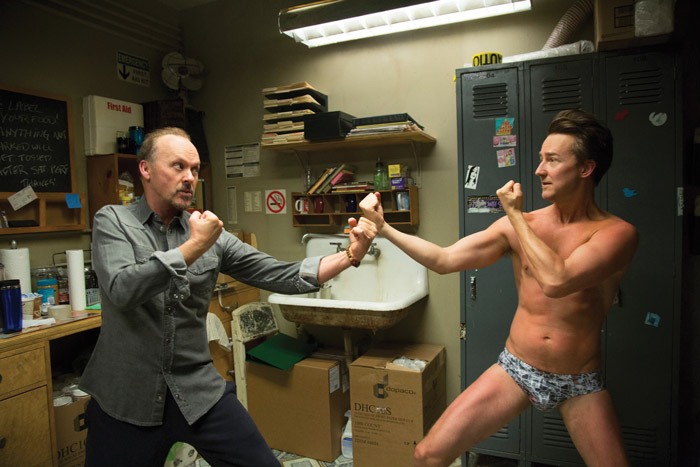I’ve often wondered why actors don’t just retire after starring in a high-grossing film. Presumably, they have more than enough money to do whatever they want for the rest of their lives, so what makes them turn away from a life of comfort? Is it fear of boredom? Is it ambition, or the desire for money or fame? Or is it the human impulse to keep moving? At its heart, Alejandro Gonzalez Inarritu’s Birdman is an answer to these questions, a two hour testament to not taking the easy way out.
Birdman follows Michael Keaton, playing a fictionalized version of himself: A washed-up actor most famous for playing a winged superhero in the early ’90s—Batman is changed to Birdman, presumably for legal reasons—following him through the days leading up to the premiere of the Broadway play that he’s writing, directing, and starring in. He has to contend with a co-star who’s brilliant, but difficult to work with (Edward Norton), a daughter just out of rehab (Emma Stone), and a critic from the New York Times threatening to lambaste his play. On top of that, he has to deal with the fact that if his play fails, his career is basically over.
Keaton is outstanding here, and Birdman is in the running for the best work of his career. He throws everything he’s got at the audience, never afraid to get ugly or unlikable. He plays a narcissicist who nonetheless manages to win the audience over by gradually revealing a deeply human and relatable source for his pain. He’s someone who, above all, derives his sense of self-worth entirely from the judgments of others, and is therefore afraid that if his play fails, he’ll be forgotten—or worse, only remembered as Birdman. Every aspect of the film emanates from his skewed point of view, which is why every character acts not as how they actually are, but how he perceives them to be. It’s why the groveling voice of his Birdman character seems to magically speak to him, or how he may or may not be able to move objects with his mind; reality bends around him.
The supporting cast is also fantastic, elevating material that could ring false or sound hacky with less capable actors. Norton is the standout, giving us a strange blend of sincerity and bravado that frames him as the thematic antagonist. Stone plays a different type of character than she usually does, showing a shade of vulnerability that isn’t present in any of her other work. Zach Galifanakis, Naomi Watts, and Amy Ryan round out the cast, as the straight-man characters who have to deal with Keaton’s outbursts and insecurities.
The film is beautifully shot, capturing the exuberance and the immediacy of live theatre by keeping the camera constantly moving. Cinematographer Emmanuel Lubezki earns his keep, making the film look absolutely gorgeous, shooting in a dim light that makes everything look more intimate. Outdoor scenes seem to always take place at the time of day where the lights of New York City start to overpower the light of the sun. The camera swoops between subplots, gracefully drifting from the narrow hallways and exposed pipes of behind-the-scenes to the majesty of the open stage. This serves as a counterbalance for the score, which is almost entirely comprised of pounding, off-kilter drums and cymbals that ratchet the claustrophobia and suspense up even higher. The dialogue is pithy and vulgar, achieving the same effect as the score.
Though the decision to shoot the entire film as if it were one long contiguous take may seem gimmicky, it feels like this is the only type of filmmaking that can really do justice to the inherent excitement of live theatre. Everything is almost out of focus or just off-centre—you feel like it could all come crashing down at any moment, but it never does. Subplots begin and vanish without mention, characters are seemingly completely forgotten for large sections of the film, and yet none of that matters. Everything is simultaneously important and unimportant, flitting into and out of the periphery at a moment’s notice. This is not a film concerned with story structure or character development or even nuance. It’s asking, “What is happening right now?” and answering, “Everything.”









